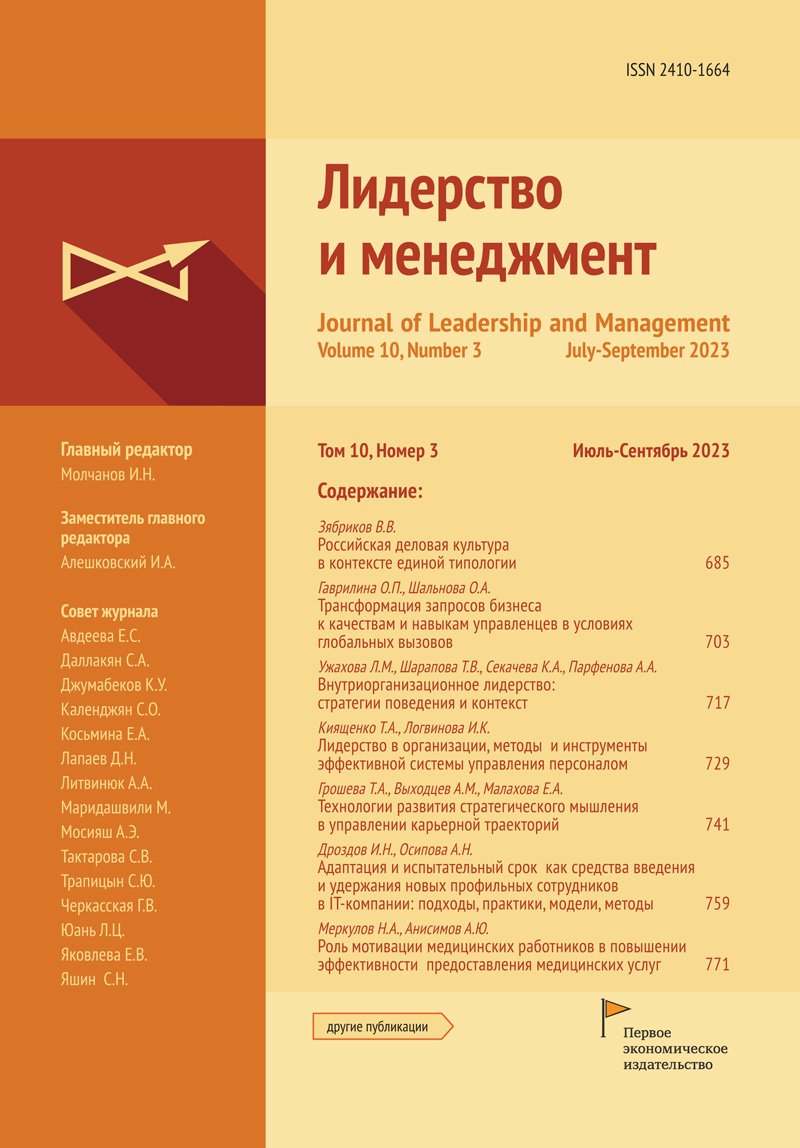Intra-organizational leadership: behavioral strategies and context
- Authors: Uzhakhova L.M.1, Sharapova T.V.1, Sekacheva K.A.1, Parfenova A.A.1
-
Affiliations:
- University of Tyumen
- Issue: Vol 10, No 3 (2023)
- Pages: 717-728
- Section: Articles
- URL: https://journals.eco-vector.com/2410-1664/article/view/607948
- DOI: https://doi.org/10.18334/lim.10.3.118314
- ID: 607948
Cite item
Abstract
This article is devoted to the study of the implementation of leadership in the management of a modern organization. From the positions of different theories of leadership and the views of well-known experts in the field of organization management, the main approaches to understanding leadership, personal and behavioral characteristics of a leader, types of behavior and styles are considered. The emphasis is placed on the description of transactional and transformational leadership concepts as one of the most promising. The results of the study of leadership styles on the example of two acting managers are presented. Their personal and professional qualities, peculiarities of behavior and influence are analyzed; the dominant leadership style is determined. Organizational and managerial factors are identified. They are as follows: the stage of the organization life cycle and types of organizational culture that affect the level of motivation of managers, which can develop or limit the manifestation of leadership potential.
About the authors
Leyla Magomedovna Uzhakhova
University of Tyumen
Email: l.m.uzhakhova@utmn.ru
Tatiana Valentinovna Sharapova
University of Tyumen
Email: t.v.sharapova@utmn.ru
Kristina Andreevna Sekacheva
University of Tyumen
Email: Sekacheva-2003@mail.ru
Anastasiya Aleksandrovna Parfenova
University of Tyumen
Email: an.alexandrovnaa@mail.ru
References
- Аппело Ю. Agile-менеджмент: Лидерство и управление командами. / Практическое руководство. - Москва: Альпина Паблишер, 2018. – 534 c.
- Ахильгов М.Б., Ужахова Л.М. Роль организационной культуры как ценностной основы бренда в успешной деятельности организации // Московский экономический журнал. – 2021. – № 11. – doi: 10.24412/2413-046X-2021-10668.
- Кови С. Семь навыков эффективных менеджеров: Самоорганизация, лидерство, раскрытие потенциала. / Пер. с англ. - 2-е изд. - Москва: Альпина Паблишер, 2016. – 88 c.
- Комаров В.В. Организационное лидерство: подходы к определению и классификации стилей лидерства // Лидерство и менеджмент. – 2022. – № 2. – c. 439-460. – doi: 10.18334/lim.9.2.114367.
- Коттер Д.П. Лидерство Мацуситы: Уроки выдающегося предпринимателя ХХ века. / 5-е изд. - Москва: Альпина Паблишер, 2016. – 254 c.
- ZRR716 Менеджмент в действии. / Учеб. пособие в 7 книгах. Книга 1. Введение в менеджмент. - Жуковский: МИМ ЛИНК, 2013. – 112 c.
- Миракян А.Г. Лидерство в XXI веке: корреспонденция теории и практики // Вестник Московского университета. Серия 6: Экономика. – 2018. – № 6. – c. 133-151.
- Модель жизненного цикла Адизеса. Powerbranding.ru. [Электронный ресурс]. URL: http://powerbranding.ru/biznes-analiz/olc-models/adizes-theory/?ysclid=lbeyss0olu837281540 (дата обращения: 25.04.2023).
- Тихомиров А.А., Спэнглер У.Д. Стили лидерства и успешность слияний: трансформационно-трансакционная концепция лидерства // Российский журнал менеджмента. – 2005. – № 2. – c. 71-98.
- Тихомирова О.Г. Организационная культура: формирование, развитие и оценка. - М.: Инфра-М, 2022. – 151 c.
- Друкер П. Эффективный руководитель. / Пер. с англ. - 10-е изд., доп. - М.: Манн, Иванов и Фербер, 2021. – 240 c.
- Bass B.M. From transactional to transformational leadership - learning to share the vision // Organizational Dynamics. – 1990. – № 3. – p. 19-31.
- Bennis W. On Becoming a Leader. Mcs.gov. [Электронный ресурс]. URL: https://www.mcs.gov.kh/wp-content/uploads/2017/07/On-Becoming-a-Leader_BOOK.pdf.
- Gritton J. Leadership Theory in a Nutshell, workshop handout. - London: GB Learnir Consultancy, 2006.
Supplementary files









